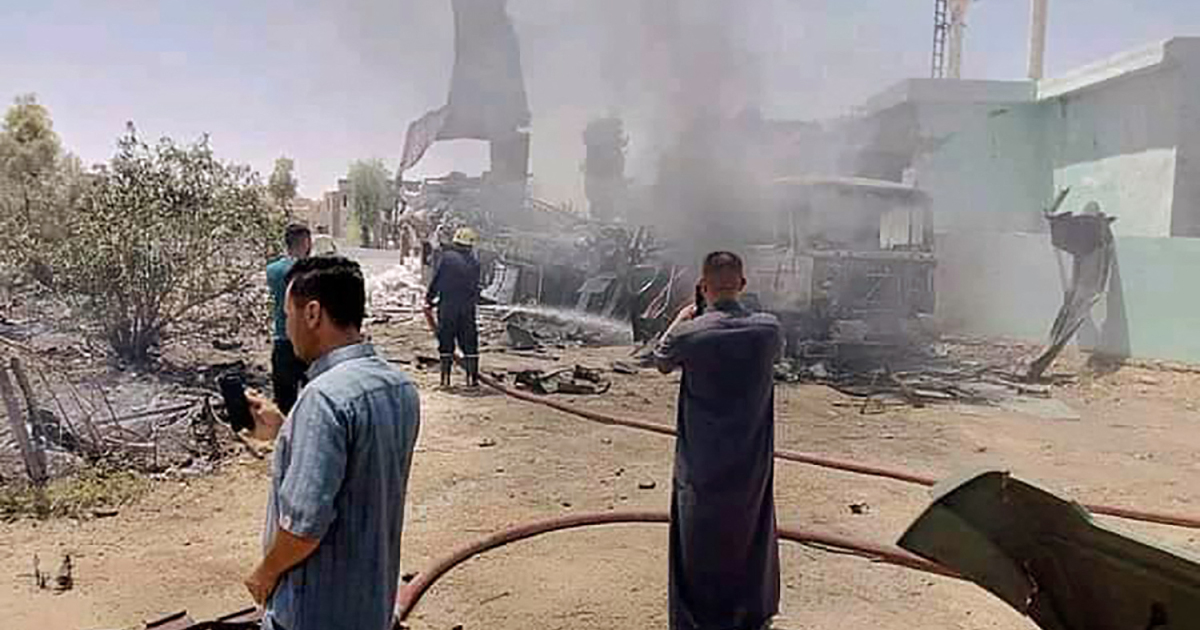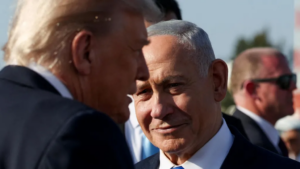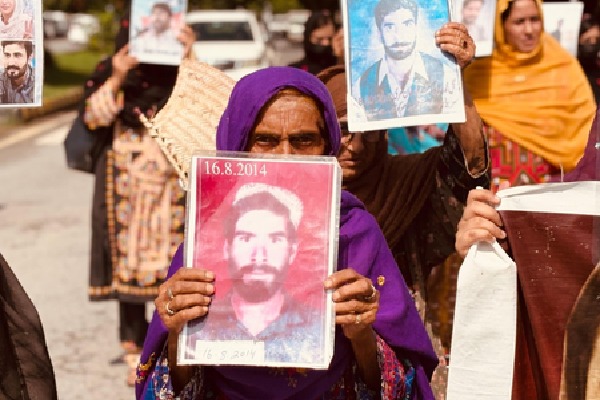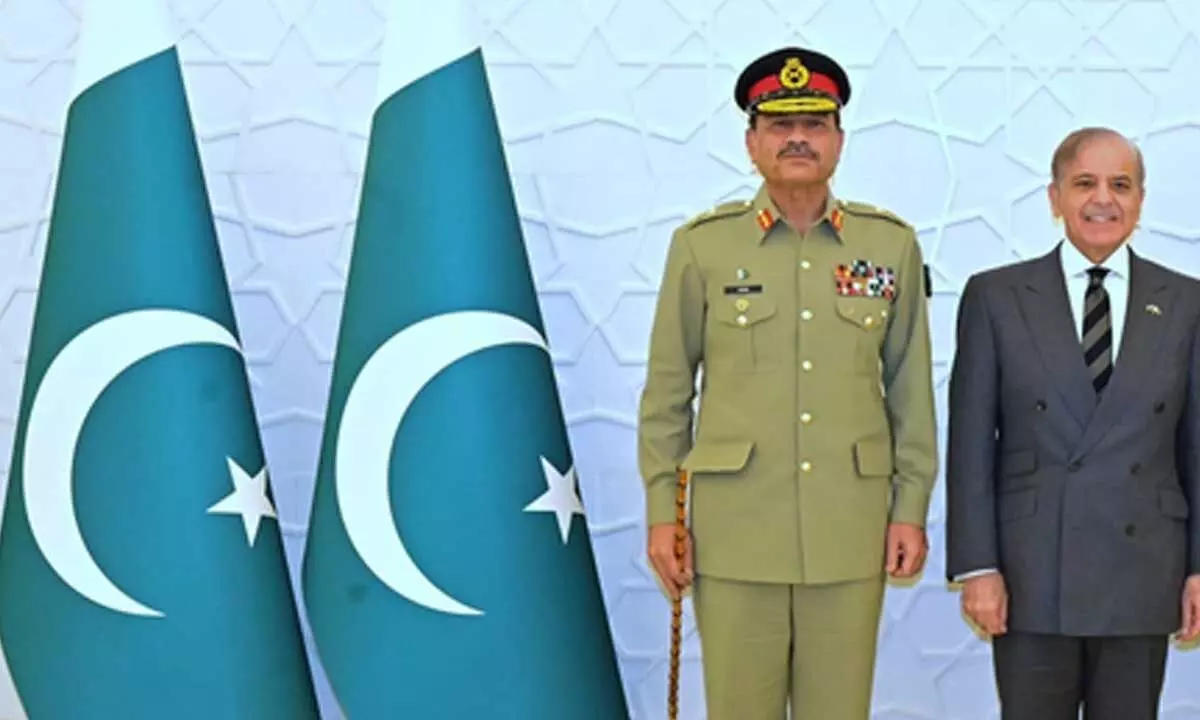
Observers say even if neither side wants the conflict to escalate, attacks have become a dangerous tit-for-tat cycle.
Pro-Iran militias are “playing with fire” by attacking American interests in Iraq and the recent escalation in tit-for-tat strikes could spiral out of control, analysts warn.
Two dozen rockets were fired towards the Ain Al-Assad base in western Anbar governate that houses Iraqi and American forces on Tuesday in a brazen assault that wounded two service members.
A missile launcher used in the attack exploded near the base and damaged several buildings, including a mosque.
Hamza Mishaan was among a number of civilians wounded by the blast. He questioned why civilians were now being caught up in the fighting.
“I was looking from the window when the explosion detonated and shrapnel hit me in the head. Why is this is happening in our area? We are not part of this conflict,” Mishaan told Al Jazeera.
General Tahsin al-Khafaji of Iraq’s Joint Operation Command acknowledged attacks were becoming more diverse.
“The terrorists have been using various ways to reach the base. This time missiles were hidden under flour sacks. We are now collecting evidence to identify the perpetrators,” he said.
‘The necessary authorisations’
The truck used was reduced to twisted metal and lay beside the blast-shattered mosque after the latest pro-Iranian forces’ attack against US interests in Iraq.
“The whole neighbourhood was damaged, houses burned, windows broken,” said resident Hamza Abdulrazzaq, his head wrapped in a bandage. “The government should protect us. Why should we always pay the price?”
There have been attacks before on the base in Iraq’s desert province of Anbar, which hosts troops from the US-led coalition against the armed group ISIL (ISIS). But this operation was bigger than the previous ones.
Iraqi General Hamad Namess said a total of 24 rockets were fired on Tuesday from a truck transporting flour.
“The vehicle had all the necessary authorisations to cross the checkpoints,” he told journalists on Thursday, speaking at the site of the attacks.
Fourteen of the projectiles hit their target, causing minor injuries to two personnel on the base.
‘Playing with fire’
The Pentagon said on Thursday it was deeply concerned about a series of attacks on US personnel in Iraq and Syria in recent days.
“They are using lethal weaponry. I don’t know how you can say anything other than it is a serious threat,” Pentagon spokesman John Kirby told reporters.
Iraqi militia groups aligned with Iran vowed to retaliate after US air strikes on the Iraqi-Syrian border killed four of their members last month.
Iran denied supporting attacks on US forces in Iraq and Syria and condemned US strikes on Iranian-backed groups.
Iraq, long an arena for a bitter rivalry between the US and Iran despite their shared enmity towards ISIL, has seen growing numbers of rocket and drone attacks on American targets in recent months.
The last few days have seen repeated strikes on US interests in the west, the Kurdish region of northern Iraq in the north, and the US embassy in Baghdad.
Some have been claimed by previously unknown groups demanding the departure of the “American occupier”, or promising to avenge the deaths of comrades killed in US bombings.
But observers blame them on existing pro-Iranian factions, operating under the umbrella of the Hashd al-Shaabi paramilitary alliance formed to fight ISIL.
Commanders from the Hashd, which is integrated into state forces and has become a major political player, often praise the attacks – without ever claiming responsibility.
Hashd has pledged revenge for the deaths of its forces in US air attacks in Iraq and Syria.
Analysts warn even if neither side wants the conflict to escalate, the attacks have turned into dangerous tit-for-tat violence.
One senior military official warned Iraqi armed groups “are playing with fire”.
Losing legitimacy?
“We can expect the cycle to continue,” said Marsin Alshamary, an Iraq specialist at the Brookings Institution, a Washington-based think-tank.
Pro-Iranian forces have carried out dozens of attacks against US interests in Iraq since the start of the year, mainly as shows of force.
Iraq researcher Hamdi Malik of the Washington Institute said recent attacks by Iran-aligned groups in Iraq and eastern Syria were a way of bolstering support.
Pro-Iranian groups suffered a heavy blow in January last year with the US killing of Iran’s revered commander Qassem Soleimani and his Iraqi lieutenant Abu Mahdi al-Muhandis.
“By not acting when more of their people are killed, [pro-Iran groups] risk losing their credibility and legitimacy in the eyes of their own bases,” Malik said.
They are also cautious of “losing respect in the eyes of other components of the ‘axis of resistance’ in other countries in the region”, he said, referring to pro-Iranian forces in Syria, Lebanon and Yemen.
On the other side, Washington “is trying to curb the influence and the authority of these militias”, said Alshamary.
The Iraqi state has repeatedly condemned the rocket and drone attacks, but has been unable to put any of the perpetrators on trial, Alshamary said.
Such incidents have escalated in Iraq and Syria even as the US and Iran conduct delicate negotiations aimed at reviving a 2015 accord on Tehran’s nuclear activities, thwarted by the Trump administration in 2018.








